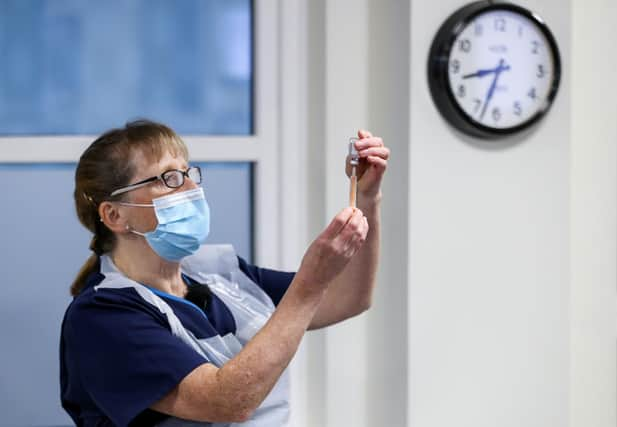Scotland to deliver 400,000 Covid-19 vaccines a week from end of February


The Health Secretary gave an update on the Covid-19 vaccine rollout to the Scottish Parliament on Wednesday morning.
She announced that as of the end of Tuesday, 191,965 Scots had been given a first dose of the vaccine.
This means 16,023 doses were given on Tuesday, an increase on 12,565 the day before.
Advertisement
Hide AdAdvertisement
Hide AdSome 2,990 people have received a second dose of the Pfizer vaccine, although the timetable for second doses was changed in the new year from three weeks after the first to up to 12 weeks later.
From the end of February Scotland will have the capacity to vaccination 400,000 people a week, Ms Freeman said.
This will involve 1,700 full-time equivalent vaccinators a day, as well as just under 1,000 support staff.
In Feburary and March mass vaccination centres will be brought into use, with the capacity to deliver more than 20,000 vaccines a week in a single location. These will include the Edinburgh International Conference Centre, Queen Margaret University and the Aberdeen Exhibition and Conference Centre.
The NHS Louisa Jordan is also currently serving as a vaccination centre.
Ms Freeman said the vaccination rollout is taking place across the country seven days a week, between 8am and 8pm, but that these hours can be extended if that proves more “convenient”.
Just over 80 percent of care home residents have been given a first dose, along with 55 per cent of care home staff and 52 percent of frontline NHS and social care staff.
Ms Freeman outlined the current vaccination timetable, saying the aim is for 400,000 doses to be given a week from the end of February.
Advertisement
Hide AdAdvertisement
Hide AdBy the first week in February, all residents in care homes and staff will have been given a vaccine, along with frontline NHS and social care staff and those 80 and over.
By mid February, those over 70 will have been given a first dose, and the aim is to deliver a dose to all those over 65, and the clinically vulnerable by the beginning of March.
Ms Freeman said Scotland will receive the first deliveries of the Covid-19 vaccine made by Moderna, the third vaccine to be approved in the UK, in early April.
She also gave details of Scotland’s current supply of Covid-19 vaccine doses, information which the Scottish Government has previously been reluctant to provided.
As of Wednesday, Scotland has an allocation of 562,125 doses of vaccine, Ms Freeman said. Some 365,000 doses are already in the hands of vaccination centres, health boards or GPs.
A further 155,025 doses of the Pfizer vaccine and 42,100 doses of the AstraZeneca vaccine are in transit, Ms Freeman said.
In February and March more vaccination centres will be brought into use, including community pharmacies, mass vaccination centres and mobile vaccination clinics.
A more detailed plan for the vaccination rollout will be published later today.
Advertisement
Hide AdAdvertisement
Hide AdMs Freeman said the country is facing a “more perilous” situation than at any time during the pandemic.
"While our NHS is very hard pressed, and yet again, we owe a huge debt of gratitude to our NHS and social care staff, we have more at our hand to fight this,” she said, referring to Covid-19 restrictions, testing capacity, and the vaccination programme.
A message from the Editor:
Thank you for reading this article. We're more reliant on your support than ever as the shift in consumer habits brought about by coronavirus impacts our advertisers.
If you haven't already, please consider supporting our trusted, fact-checked journalism by taking out a digital subscription.
Comments
Want to join the conversation? Please or to comment on this article.
